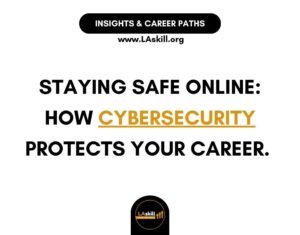Join our 10-week hands-on digital skills/internship training program starting May 6th. Enroll Now→
Cybersecurity for Beginners: Protecting Your Data and Your Career

In our increasingly digital world, the importance of cybersecurity cannot be overstated. With personal and professional data constantly under threat from cybercriminals, understanding how to protect your information is essential—not just for safeguarding your data but also for advancing your career.
In this blog post, we’ll explore the fundamentals of cybersecurity, why it matters, and how you can begin your journey to becoming a cybersecurity-savvy professional.
The Growing Importance of Cybersecurity
As businesses and individuals become more reliant on technology, the risks associated with cyber threats are skyrocketing. Here are some alarming statistics that highlight the urgency of cybersecurity:
- Cybercrime Costs: According to estimates, global cybercrime costs are projected to reach $10.5 trillion annually by 2025.
- Data Breaches: Every day, an average of 30,000 websites are hacked, making it critical for individuals and businesses to implement robust security measures.
- Skill Shortage: The demand for cybersecurity professionals continues to outpace supply, with an estimated 3.5 million unfilled cybersecurity jobs worldwide. This presents a unique opportunity for beginners to enter a lucrative field.
Understanding The Basics
Cybersecurity encompasses a range of practices designed to protect systems, networks, and data from cyber threats. Here are the key concepts every beginner should understand:
1. Types of Cyber Threats
- Malware: Malicious software, including viruses, worms, and ransomware, designed to damage or disrupt systems.
- Phishing: A technique used by cybercriminals to deceive individuals into revealing sensitive information, often through fake emails or websites.
- Denial-of-Service (DoS) Attacks: An attempt to make a machine or network resource unavailable by overwhelming it with traffic.
2. Fundamental Security Practices
- Use Strong Passwords: Create complex passwords and change them regularly. Consider using a password manager for added security.
- Enable Multi-Factor Authentication (MFA): This adds an extra layer of security by requiring more than just a password to access accounts.
- Regular Software Updates: Keeping your operating systems and applications updated ensures that you have the latest security patches.
3. Data Protection Strategies
- Backup Your Data: Regularly back up important files to prevent loss in the event of a cyberattack.
- Encrypt Sensitive Information: Use encryption tools to protect your data, especially when sharing information over the internet.
How Cybersecurity Protects Your Career
Understanding cybersecurity not only protects your data but also enhances your career prospects. Here’s how:
- In-Demand Skill Set: As organizations prioritize cybersecurity, possessing these skills makes you a valuable asset in the job market. Knowledge of cybersecurity can lead to roles such as cybersecurity analyst, network administrator, or IT consultant.
- Career Advancement: Demonstrating cybersecurity awareness can set you apart from peers, leading to promotions and new opportunities within your organization.
- Business Protection: Whether you work for a startup or a large corporation, understanding cybersecurity helps protect your company’s reputation and financial health, contributing to its overall success.
Getting Started with Cybersecurity
Here are some steps to consider to help you get started:
1. Educate Yourself
Start with online courses, tutorials, and books that cover the fundamentals of cybersecurity. Resources like Coursera, edX, and Lynda offer excellent introductory courses.
2. Hands-On Practice
Consider setting up a home lab to experiment with security tools and techniques. This practical experience will deepen your understanding and enhance your skills.
3. Join Online Communities
Engage with cybersecurity communities and forums, such as Reddit or LinkedIn groups. Networking with professionals in the field can provide valuable insights and support.
Why Choose LAskill?
- Expert-Led Training: Learn from seasoned cybersecurity professionals who provide real-world insights and practical knowledge.
- Flexible Learning Options: Choose between online and in-person training to fit your schedule and learning preferences.
- Hands-On Experience: Gain practical skills through interactive exercises and case studies, ensuring you’re prepared for real-world challenges.
Don’t wait until it’s too late—take charge of your digital safety and career today!
Check out our beginner-friendly courses and learn how to protect yourself and your career from cyber threats. With flexible learning options and expert guidance, you’ll gain the skills needed to navigate the digital landscape securely.







